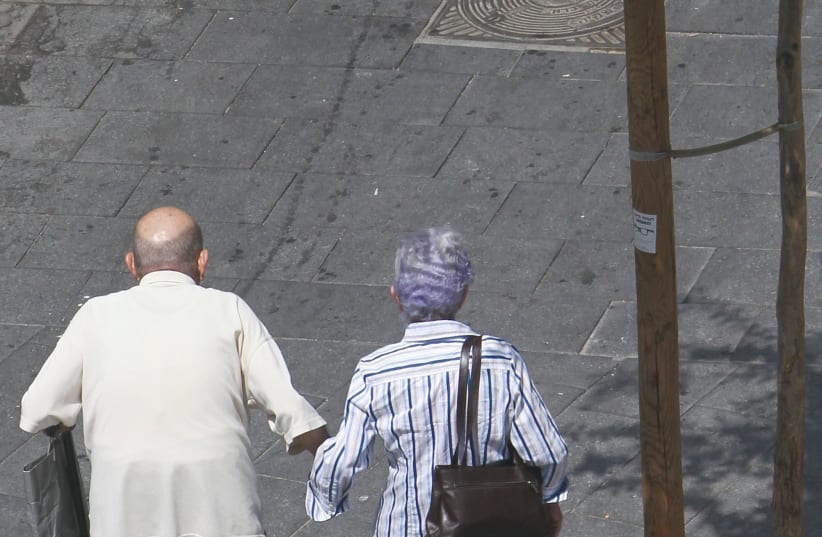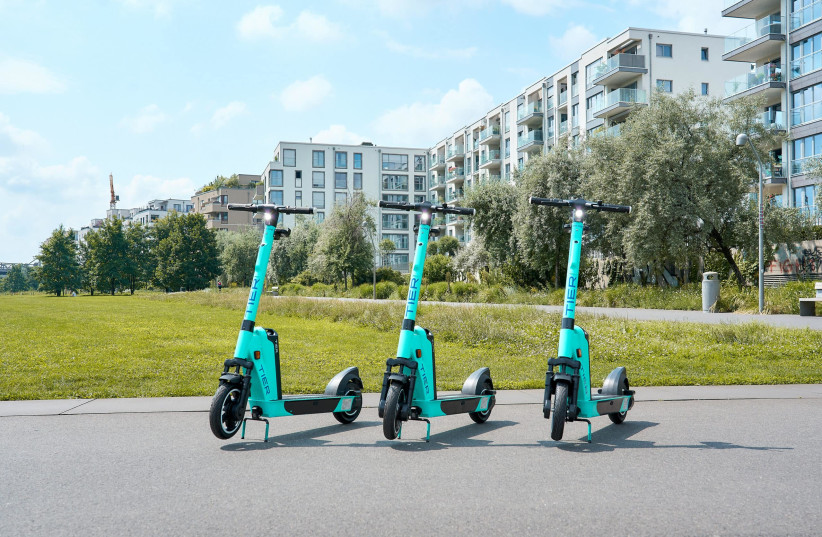Toward the end of last month, Jerusalemites Jeffrey and Lynn Fisher were in Tel Aviv on their way to the Tel Aviv Cinematheque. Walking along Kaplan Street, they witnessed a collision between two electric scooters on the bike path alongside them. One of the riders crashed into Lynn. The two riders, seemingly none the worse for their ordeal, apologized profusely and continued on their respective ways, leaving Lynn in pain.
When the pain became unbearable, she taken to Ichilov Hospital and within 90 minutes of the accident, was on the operating table. The blow to her stomach had caused a perforation in her small intestine. Happily, she has made a remarkably quick recovery and is grateful that the damage was not as bad as it might have been.
However, she and her husband are eager to have amendments made to legislation related to electric vehicles on the pavement.
According to a lawyer they consulted, they have no legal recourse as the Supreme Court has ruled that neither electric bikes nor electric scooters are classified as motorized vehicles. (Because if they were, they would require insurance – a financial burden on the mostly young people who ride them.)
The lack of insurance creates the lack of incentive for the riders to ride responsibly and not recklessly, says Jeffrey.
“The vehicles are basically encroaching on pedestrian territory,” he states. Indeed, for many pedestrians, electric vehicles on the pavement are a recurring nightmare.
On the other hand, senior citizens Jennifer Hall and her husband, who live in Kiryat Ye’arim (Telz-Stone), where she drives an electric mobility vehicle, known in Hebrew as a Kalnoit, for her own safety prefers to drive on the pavement – aside from the fact that too many cars and trucks are illegally parked on the pavement, making it extremely difficult if not impossible for people in Hall’s position to get from the road to the pavement and vice versa, and often not leaving sufficient room for Kalnoit drivers to navigate the pavement.
Whatever gripes Jerusalemites have against Mayor Moshe Lion, he has at least, at intersections all over the city, ensured that the pavement dips into the road like a mini ramp, to make it easier for vehicles of all kinds, including baby carriages and shopping trolleys, to go up or down.
For some 18 months, Hall has been asking the head of her municipality and its engineering department to lower the curbs, as has been done in Jerusalem, so that she does not have to travel on the road to the grocery store and the library, where she has to compete for space with speeding cars and buses. But she has hit the brick wall of bureaucracy, and has not succeeded in bringing about the change that would benefit so many.
On a recent visit to Jerusalem, she and her husband went to Geula, where they were horrified to see how many cars were parked on the pavement.
But that’s not the worst of Geula. What is even more horrifying is to see how many mothers are wheeling infants in baby carriages across the traffic-packed roads while talking on cellphones.
■ THERE ARE more than enough bureaucratic hassles within Jerusalem. Yediot Yerushalayim, the Jerusalem supplement of Yediot Aharonot, last week ran a story about Simcha Noach, a wheelchair-bound senior citizen who would love to visit her many children and grandchildren, but is prevented from doing so because there is no elevator in the Sanhedria building where she lives. Only when she has to visit a doctor for treatment of her neurological disease is she carried downstairs in an undignified fashion, which is, frankly, humiliating.
The building, which was classified as unsafe, underwent an upgrade eight years ago, and the plan called for the installation of an elevator, which for some reason was overlooked. The upshot is that there is no elevator despite complaints to city hall by members of her family. Her relatives understand that it is now unfeasible to install an indoor elevator, but they want the city to install an outdoor elevator. Their pleas fall on deaf ears, and Noach is a prisoner in her own apartment.
■ ANOTHER SENIOR citizen, Ellen Sucov, who lives in what was once a quiet street in Katamon, is woken up every morning by what she says is the horrible crashing and banging at a nearby demolition site, which begins at 7 a.m. and continues throughout the day.
Like many other Jerusalemites, she cannot understand “this abominable crusade of demolition and dirt and noise in our previously quiet neighborhoods.”
■ FORMER JUSTICE minister and candidate for the presidency of the state, Meir Sheetrit, has been appointed head of the Public Council of the Jerusalem-based Academy of the Hebrew Language and administrative head of Minveh, the Academy’s new name when it moves into its new $50 million home in the National Precinct, in the area where most government ministries and state buildings are located.
The word “minveh” is a derivative of the Hebrew noun naveh, which means home, and as an adjective also means beautiful.
Sheetrit has a long history of public service in both local and national politics, and to some extent in international politics. He is a former mayor of Yavne. He was a longtime member of Knesset and held several ministerial positions, including that of finance minister. He also took a break from the Knesset to serve as treasurer of the Jewish Agency and the World Zionist Organization.
■ WHILE THE Chief Rabbinate opposes the measures of Yamina’s Matan Kahana (now back as religious services minister after recent back-and-forth jockeying) to amend kashrut services, the rabbinate itself has seriously fallen down on the job by allowing certain chains to operate, or to give a franchise to, outlets that are both kosher and nonkosher. Among the examples are Aroma, McDonald’s, El Gaucho and a bunch of restaurants operated by celebrity chefs.
Now, according to a recent article by Jessica Steinberg in The Times of Israel, the newest Brown Jerusalem boutique hotel, which opened last December at 41 Hillel St., near the Nahalat Shiva Mall, is giving up its kashrut certification from Tzohar, in the hope of attracting a wider clientele. Does this mean that other Brown hotels will follow suit?
Many Jewish tourists and new immigrants naively believe that all restaurants and hotel dining facilities in Israel are kosher, and as a result find themselves eating food forbidden by Jewish dietary laws. One of the most common errors is in restaurants that serve pork, which on the menu is generally listed as white meat. Some people mistakenly believe that this refers to breast of chicken or turkey. It’s time for the rabbinate to crack down and declare that a restaurant or hotel chain is either kosher or not kosher. It can’t be both, because that amounts to fooling the public.
greerfc@gmail.com

